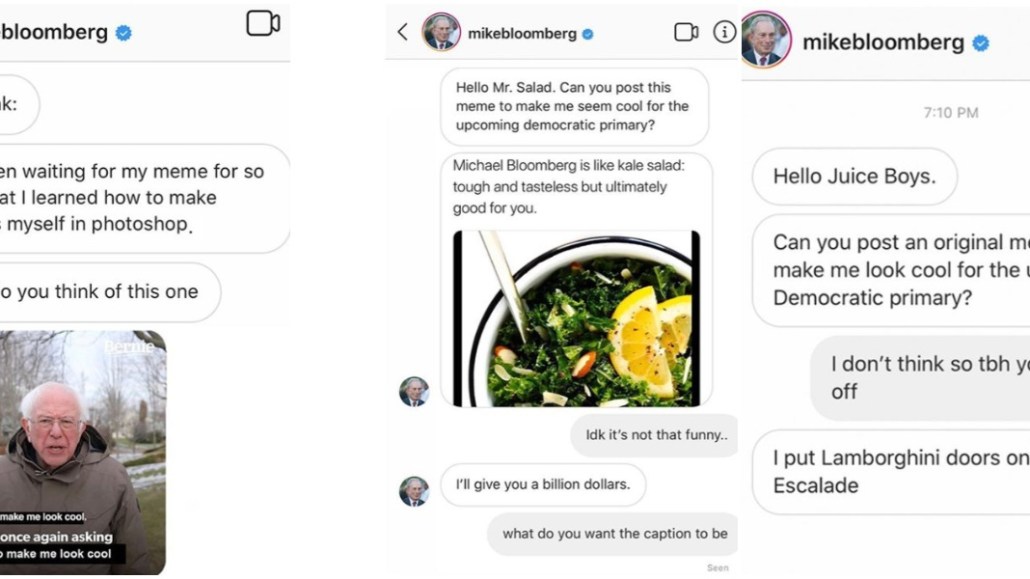Last chance to save on Digiday Publishing Summit passes is February 9
‘The buzz from Bloomberg has other people looking’: Why 2020 is going to be the influencer election

The 2020 presidential election may not only be the meme election but the influencer election.
Last week, a flurry of ads paid for by the Michael Bloomberg campaign were posted by dozens of influential meme accounts like @KaleSalad and @Tank.Sinatra. The ads, which come from a new company, Meme 2020, didn’t say much about Bloomberg as a candidate or tell the accounts’ followers how they should vote. Instead, the campaign used the meta ads — text-like messages between the Bloomberg campaign and the account poking fun at Bloomberg’s attempt to seem cool to younger voters by using memes — as an awareness play.
Bloomberg isn’t the only candidate to wade into paid influencer marketing this election cycle. Before dropping out of the race, a Super PAC for Senator Cory Booker reportedly offered influencers cash for posts about the former candidate. But influencer marketing experts say that the recent effort by Bloomberg’s campaign is likely the largest and most successful, at least in terms of the earned media it generated, use of paid influencer marketing by a politician they’ve seen to date. They also say they expect a significant swell of political influencer marketing to come as other candidates eye the attention Bloomberg has gotten for the memes.
“We’ve been getting a lot of inbound interest in paid campaigns,” said Ted Murphy, CEO of influencer marketing platform Izea. “The buzz from Bloomberg has other people are looking at influencer marketing as a potential strategy.” Murphy declined to share where the requests have come from or identify if they are from other presidential candidates.
Ryan Detert, CEO of Influential, agreed that political influencer marketing is on the rise. “It’s going to continue to grow,” said Detert before cautioning that pure-play endorsements of particular candidates will likely cause backlash for influencers. Instead, Detert believes that the use of influencers will be similar to that of Bloomberg’s meme strategy, i.e. they will be used as part of an awareness strategy rather than paid to post about why they are voting for a particular candidate. “If it feels forced there will be backlash,” said Detert.
Using influencers for a paid awareness strategy makes sense to Sway CEO Danielle Wiley. “Younger voters are not seeing TV ads,” said Wiley, adding that using influencers can help candidates reach millions of 18 to 24-year-olds where they are spending their time. “ Purely for impressions and eyeballs, [influencer marketing] can be huge.”
It’s unclear how much money is being spent on influencers this campaign cycle. As previously reported by The Daily Beast, prior to the meme strategy the Bloomberg campaign worked with branded content marketplace Tribe to pay influencers $150 per post. Spending on television ads during this campaign cycle, meanwhile, has topped $435 million with $230 million of that by Bloomberg, according to the Wesleyan Media Project.
But even though the strategy is about awareness, not endorsement, influencer marketing experts expect that disclosure issues will crop up. Political advertising is managed by the Federal Election Commission, which has not updated regulations for the current digital advertising environment, as Buzzfeed reported. The Federal Trade Commission, which handles influencer marketing for brands, has repeatedly updated guidelines for how influencers should disclose relationships with advertisers but Influencers don’t always follow those guidelines. Influencer marketing experts believe the same issue will come up with political advertising by influencers.
While 2020 candidates may be eyeing more influencer marketing, it’s unclear how many influencers will be on board to accept cash to tout particular candidates. Doing so could not only alienate some of an influencer’s audience but could make brands less likely to want to work with that particular influencer, according to experts who say that brands already ask not to work with influencers who are outspoken about politics, religion or any contentious issues. Brands would rather work with influencers that don’t have those issues because influencers can be seen as “more like spokespeople,” said Wiley.
Still, even with potential disclosure or brand deals at play, experts believe political influencer campaigns are here to stay. “I think this will be the new normal,” wrote Kristy Sammis, executive director, Influencer Marketing Association. “Influencer marketing is now a known, established tactic – along with billboards and tv commercials. It’s worth noting that the guy behind the meme-ads is the chief executive of Jerry Media, which promoted the Fyre Festival. And I’ve said before, the influencer strategy was the ONLY thing about the Fyre Festival that actually worked.”
More in Marketing

GLP-1 draws pharma advertisers to double down on the Super Bowl
Could this be the last year Novo Nordisk, Boehringer Ingelheim, Hims & Hers, Novartis, Ro, and Lilly all run spots during the Big Game?

How food and beverage giants like Ritz and Diageo are showing up for the Super Bowl this year
Food and beverage executives say a Super Bowl campaign sets the tone for the year.

Programmatic is drawing more brands to this year’s Winter Olympics
Widening programmatic access to streaming coverage of the Milan-Cortina Games is enabling smaller advertisers to get their feet in the door.








